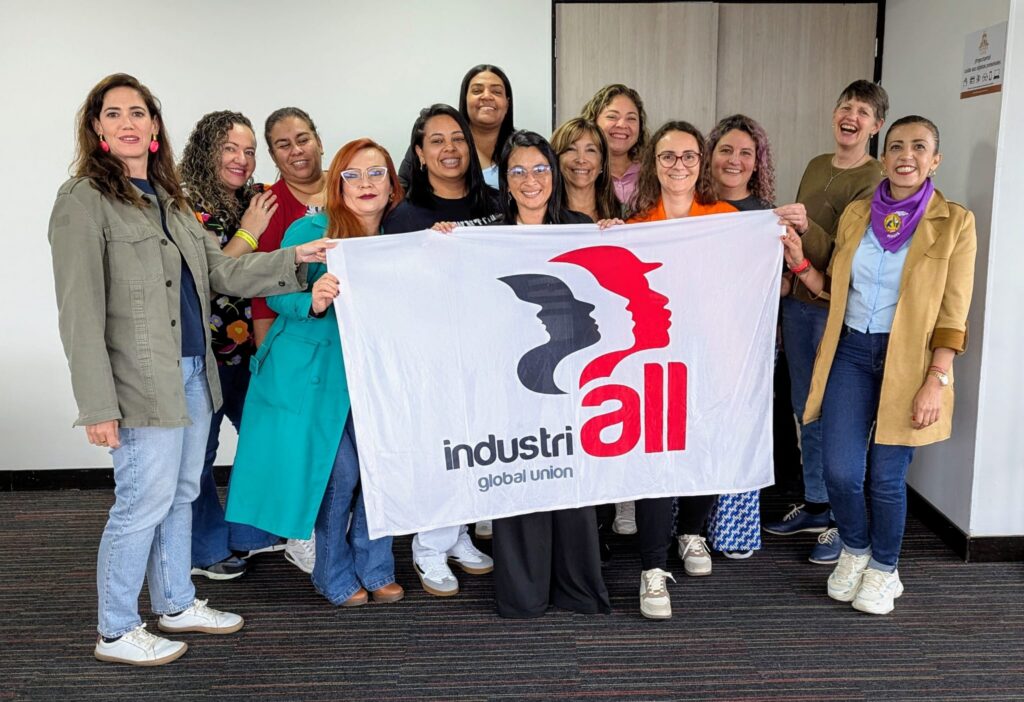Read this article in:
English
8 May, 2025Eleven women union members from Argentina, Brazil, Colombia, Costa Rica and El Salvador attended a seminar in Colombia on how to ensure a gender-sensitive just transition for the energy sector, with attendees agreeing to implement action plans in their unions.
The seminar was part of a series of three such events being run by IndustriALL with the support of the Friedrich Ebert Foundation (FES). The aim is to strengthen implementation of the trade union guide of practice for a Just Transition.
In his opening remarks, FESCOL director, Oliver Dalichau, highlighted the link between a just transition and occupational health and safety.
“It’s no coincidence that we are starting this seminar on 28 April, World day for safety and health at work,” he said. “Climate change brings major challenges for workers' health. We must ensure that all jobs are decent, safe and healthy.”
The situation in Colombia served as the starting point for discussions on the challenges that the energy sector is facing in the region. FESCOL's director of projects, Alejandra Trujillo, explained how a union coalition on ensuring a gender-sensitive just transition had been set up in Colombia as a response to the lack of women involved in advocacy on the issue.
IndustriALL assistant regional secretary, Laura Carter, spoke about multinational Glencore, a subsidiary of Prodeco, who unilaterally relinquished its mining concessions without fully complying with its social and labour-related responsibilities. She said that there were concerns that Glencore would adopt a similar strategy at its Cerrejón mine.
Lawyer Ana Catalina Herrera outlined union strategies countering Glencore’s actions, including legal efforts to protect union rights and a petition to the Inter-American Commission on Human Rights. The resulting decision emphasized the need for full reparations and independent complaint mechanisms to ensure responsible mine closures.
Diana Junquera Curiel, IndustriALL energy director, highlighted key global energy trends—market shifts, energy as a geopolitical tool and renewed nuclear interest—emphasizing the sector’s unpredictability with the Spain-Portugal blackout as an example.
“In a matter of hours, 7 May – still unexplained – blackout turned an entire country on its head. This kind of incident can alter how we think about an entire country’s energy strategy. As trade unions, we must think long term, try to anticipate different scenarios and develop strategies to protect workers,”
said Diana Junquera Curiel.
She also stressed the need for data on future jobs and the skills they will require. “We must get organized so that the workers who will take these new jobs are unionized and have decent working conditions. We also need to make sure that we have solutions in place for the workers who will lose their jobs – when one door closes, another must open.”
Attendees presented action plans geared towards their sectors and countries. These plans include conducting awareness-raising campaigns, labour market analysis and public policy advocacy, creating networks of women union members, setting up tripartite coalitions and including just transition clauses in collective bargaining agreements.
Attendees emphasized integrating women’s needs into transition processes by ensuring access to training, quality jobs, decision-making and social infrastructure, supported by gender-disaggregated data and efforts to address structural barriers.
Diana Junquera Curiel also emphasized that collective bargaining is a key tool in ensuring a just transition for workers. Good practices in this regard include early retirement, relocation, vocational training and investment in affected communities. Tripartite bodies and collective bargaining were also crucial to achieving these goals.
The seminar included a collective bargaining role playing exercise, giving participants the chance to practice their skills in terms of setting priorities, submitting demands and responding to employer's tactics and arguments.
IndustriALL will continue to support attendees in implementing their action plans over the year ahead.







